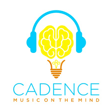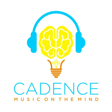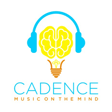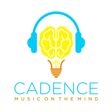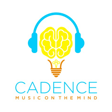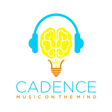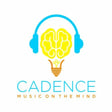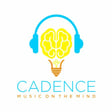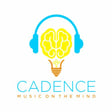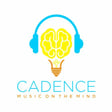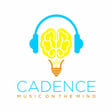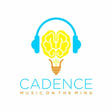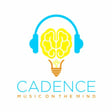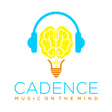Become a Creator today!Start creating today - Share your story with the world!
Start for free
00:00:00
00:00:01

S04 Episode 04: Connie Tomaino on Music Therapy and Dementia
In a special series within season 4, Indre speaks with Connie Tomaino, executive director and co-founder of the Institute for Music and Neurological Function (IMNF). This episode, Connie talks about how music therapy can benefit patients with dementia.
Cadence is the podcast where we talk about what music can tell us about the mind. Hosted by neuroscientist and musician, Dr. Indre Viskontas, the fourth season will bring you the stories of people who experience music outside the bounds of the average listener, and who use music as a tool to be heard in a society in which they are often ignored.
Transcript
Introduction to Music as Communication
00:00:07
Speaker
Welcome back to Cadence. This season on Cadence, we're telling the stories of people who experience music differently than the rest of us. Those who use music as a form of not only expression, but of communication. Of a way to be heard by a society that ignores them, or outright silences them.
Healing Power of Music Therapy
00:00:26
Speaker
We also want to explore the healing power of music by diving into the nuts and bolts of music therapy. In four special episodes this season, I chat with the legendary Connie Tomato, executive director and co-founder of the Institute for Music and Neurologic Function in New York.
00:00:44
Speaker
Last time with Connie, we discussed the role of music in helping people with Parkinson's disease. We talked about how music raises levels of dopamine in our brain, the neurochemical that is depleted in the course of the disease, and how music taps right into our movement networks, the same networks that are affected by Parkinson's because they rely on dopamine.
00:01:05
Speaker
So music therapy can help get patients moving, help them solve specific problems like getting on an escalator by giving them a beat and lifting their mood, since Parkinson's is often accompanied by depression.
Music Therapy and Memory Recall in Dementia
00:01:19
Speaker
This episode, we're back with her to talk about music's role in the treatment of another disease of aging, dementia. And there's one patient in particular that Connie remembers.
00:01:33
Speaker
Her name was Molly and Molly was basically non-verbal and she was one of those residents who was pleasant and would smile but wouldn't say anything. And obviously because of the dementia, we couldn't tell how much she knew. And I had asked her family about music that she would like or they thought that she would relate to.
00:01:58
Speaker
They said, well, she's like the James Cagney movies and all the old American Irish type songs. Now her record said that she was born in England and came to America. So with her, I was playing my instrument live with her and singing songs, some of the Irish songs. And she would start out by just sort of rocking and smiling and maybe humming a little bit.
00:02:25
Speaker
But then, over time, she would start singing some of the words to the song, so obviously she would not only recognize them, she started recalling the words to the song. And then after we would sing the song together, she would start saying things like, oh, I have to get home. The kids are coming.
00:02:48
Speaker
or just these little phrases or she'd give a number and better go now. And in the moment, it didn't sound like they meant anything. But then when I went back and looked at my notes and things that she was talking about, it was obvious that she was recalling time and place.
00:03:07
Speaker
There was one song, It's a Long Way to Tipperary, and she would say, that's a nice place. We used to go there. I mean, this was a person who was nonverbal. And here she was starting to reminisce. I spoke to the family. They said, you know, I think she was born there. She must have spent her childhood in that area. And the family was just amazed that that was possible.
Emotional Activation through Music
00:03:28
Speaker
That is amazing, because that kind of remembering, where a memory is located and time and place, where the person can put themselves back into that situation in their minds, is often hailed as a human superpower, ours being perhaps the only species that can time travel, or so they say. We now know that this episodic memory isn't unique to humans, but it's still considered one of the most complex memory tasks.
00:03:57
Speaker
The fact that a patient can go from being essentially non-communicative to reminiscing is like seeing a car go from 0 to 60 in a heartbeat. According to the World Health Organization, dementia affects upwards of 55 million people worldwide.
00:04:15
Speaker
And many people conflate dementia with Alzheimer's disease, but dementia can result from several different diseases and conditions. It's a syndrome or set of symptoms that includes a deterioration in memory function, but also other aspects of thinking and the ability to perform daily activities like cooking or getting to an appointment. These changes lead to confusion, anxiety, and often withdrawal from social interaction.
00:04:43
Speaker
About 60-70% of people with dementia do ultimately get a diagnosis of Alzheimer's disease, but there are several other neurodegenerative conditions that can cause dementia, like long-term alcohol abuse or traumatic brain injuries like multiple concussions, strokes, and even infectious diseases like HIV.
00:05:02
Speaker
But in most cases, the regions of the brain affected in dementia include the networks that allow us to pull together elements of a memory into a coherent narrative, into the constructive act of remembering. The hippocampus, a seahorse-shaped structure deep in the brain, works like an old index card in a library.
00:05:23
Speaker
It tells you where the book you want to take out is located and what else it might be connected to. So when you remember an event, the hippocampus has stored a little index of the elements that go together to form and recreate that event in your mind's eye.
00:05:39
Speaker
What do you think music does to either bypass these areas, or does it re-engage, pull together networks, take on the job of the hippocampus, which is this brain region that pulls together all these different elements of the memory? What do you think it does? Yeah, I think there's probably a couple of different things it does.
00:05:58
Speaker
It definitely arouses and stimulates emotional areas of the brain that process emotions that are very strong and we know how robust that network is to arousing then higher cortical areas.
00:06:11
Speaker
We all know that emotional events are more memorable than neutral ones. And that's because the emotional networks of the brain tag the situation as important. Hey, I'm feeling something strong here, like that bear is super scary, or winning this game makes me really proud. So let's remember that in the future.
00:06:29
Speaker
And so Connie is suggesting here that music helps wake up the brain because it elicits emotions. And it's not just the emotional regions that activate. In turn, they also activate other cortical areas.
00:06:43
Speaker
I think the research is showing this is that because areas that are still functioning, areas available to people with even severe dementia are these lower cortical networks, once they get excited, and they do get excited by emotional, relevant information,
00:07:01
Speaker
auditory sounds of the familiar music was exciting enough of these and engaging enough of these networks that it almost stimulated the ability to recall. So this like turning on the system first, which is what emotionally charged music does.
Documenting Benefits: 'Alive Inside' Film
00:07:22
Speaker
There's another reason as to why music is so effective with dementia patients, and it has to do with the sheer breadth of information and connotations that music can pull on in a person's brain.
00:07:34
Speaker
Music, because it encapsulates so much information within the context of a song, really allows it to, if one area, that the person might not be able to recall the name of the song, but they could sing the words to the song, or they could tell you why they know this song, even smile and just have an emotional reminiscence.
00:07:53
Speaker
When somebody's listening to music and you're talking about reminiscence and talking about past experiences, well, the music that we listen to all the time tends to represent those events in our lives and those feelings and those connections that we keep thinking about. And so every time we listen to a favorite song, we're reliving and remembering again those important events in our life. And so those get stored so much stronger than other types of recall.
00:08:23
Speaker
And so when somebody hears a familiar song, it's stimulating these very well-stored connections to that song that represent the person, the place, and the event in one's life. And so I think the fact that the music stimulates multiple areas
00:08:42
Speaker
that contribute to that reminiscence is what makes music such an effective tool to help with memory recall, different from photographs because we know image recognition declines with dementia as well.
Connie Tomato's Early Career with Music Therapy
00:08:58
Speaker
In 2014, the benefits of music and music therapy for dementia patients were beautifully documented in the movie Alive Inside, a film put together by the nonprofit organization Music and Memory, and that featured Connie. But as we already know, Connie's story with music in the brain goes back way further than that.
00:09:19
Speaker
the beginning of your career, you met Oliver, and he was also featured in Alive Inside. Do you have a memory, maybe even one that is a little funny, of Oliver working with you and a patient with dementia and music? There's a few.
Practical Applications of Music in Dementia Care
00:09:37
Speaker
Oh, yeah. There was a woman who had dementia, and she had been a pianist. She didn't even recognize a piano anymore. And there was a question about whether she could play. And Oliver was asking this too, because we were wondering if she couldn't recognize it, what would make her play. And so we brought it to the piano, and I just started playing. And he was a wonderful pianist too. I think the beginning of Fur Elise.
00:10:06
Speaker
and she puts her hand on the piano and starts playing the rest of it immediately. Wow!
00:10:32
Speaker
And so he was shocked, and he just thought that was amazing, that just that little cue, those couple of notes. Yeah. I mean, her hand knew exactly where to go, even though she didn't quite recognize the piano to start with. It was a little resistant, just her hands just went automatically. So he was always interested in how music could reach them.
00:10:54
Speaker
my first meeting with him, when he was examining a person with dementia, and he had used the song that he always uses, which is Bicycle of Bilford 2, and he's singing Daisy Daisy, and the woman's sort of nodding her head and smiling and looking at him. And then I told him, well, she really knows this other song.
00:11:13
Speaker
And then I sing this song is when the saints go marching in and she starts singing and dancing and moving and you know shouting out the words and he looks at me and he goes, what just happened? What was that? He said, oh, it has to be the right song. Yeah. And you just showed like the importance of musical therapy expertise. Exactly. Exactly. Yeah.
00:11:36
Speaker
So as Connie and the field of music and medicine journeyed on, people started to discover specific ways that the power of music could be employed to great benefit, particularly in cases of dementia.
Emotional Expression and Communication through Music
00:11:47
Speaker
There are many ways to think about and frame these various benefits, but maybe one way to describe some of these benefits is that they're practical, helping patients function on the day-to-day.
00:11:59
Speaker
There's ways of using music as a mnemonic tool, as a memory aid, for things like phone numbers. We do it commercially all the time, create jingles so people remember phone numbers and addresses and slogans and stuff. And then at the point that the person may need more extended care, maybe it's home care,
00:12:17
Speaker
using music to help with different times of the day, maybe to relax if they get agitated, sort of at sundown where they tend to get restless, or if the caregiver is having problems with dressing and bathing and doing some of those activities of daily living that may be a struggle. Using music, singing a song that helps a person calm down may relax them enough so they're not combative.
00:12:41
Speaker
during personal care. So those things we know work, and there's been actually some studies that show that training caregivers to use familiar music to sing with somebody actually helps calm them down, make them able to engage better. So that's important. What are ways in which music therapists might use music with patients with dementia?
00:13:03
Speaker
Music therapists normally would actually engage the person in making music with them or sing with them in the moment. And it's in the moment experience that the music therapists can tweak the music, the rhythm of the music, or repeat the song over and over again to stimulate attention. And that stimulation of attention actually then carries over to other types of engagement.
00:13:29
Speaker
It could be to build up other types of skill to maintain things like attention or verbal ability, verbal expression. It could also be to stimulate movement in the person that may be very lethargic and not able to coordinate movement that well. So the music therapist will use either rhythm or aspects of music to inform mode of function in the way that that person can use it, use their movement more effectively.
00:13:55
Speaker
So in early stages, it may be to help a balance and reduction the fault. So something that somebody with dementia may be prone to. I just want to highlight the implications of what you're saying is that let's say you start the day with a music therapy session. The benefits of that can follow the person throughout their day as they're dealing with other activities of daily living or even when they're performing cognitive tests, they seem to do better in some cases.
00:14:21
Speaker
Right, so that really speaks to the fact of when somebody's engaged in something meaningful and that attention is stimulated and held, then things like being aware of your surroundings increases and that carries over because now that arousal level
00:14:38
Speaker
has been heightened in that person. So I know a lot of doctors who like to do their exams after a music therapy session for exactly that reason, because the person is more verbal or is able to answer questions, at least in the early stages of the diagnosis.
00:14:57
Speaker
In addition to these improvements of cognitive ability and the various ways that a caregiver can help manage a patient's mood, there are also aspects to music therapy and music treatment that pertain to a more emotional side of a patient's well-being. For one, there's the patient's need to express themselves and to feel heard, to communicate with others, and be seen.
00:15:19
Speaker
No one likes being ignored, and patients with dementia spend so much time being talked over or talked at, and not that much time talking with others.
00:15:31
Speaker
So the music therapist may create this scene with a musical improvisation and having the person play the jumps to that, and it may allow that person then to express feelings. It could be frustration, it could be anger, whatever it is that the therapist feels that person is trying to express, the therapist will help facilitate that. So there is some kind of cathodic release and recognition that it's fine to feel this way.
00:16:00
Speaker
and allows that expression rather than the person just being so frustrated that they can't express themselves verbally when nobody understands what's going on. And beyond this, there's of course the patient's emotional need to feel comforted by their relationships and by the things that have meant so much in their life, their loved ones and their roots.
00:16:21
Speaker
In the early stages, when somebody's first diagnosed, sometimes it's just giving them tools that they can use to build up their memory reserve. So if I'm working with a family, one of the things I tell them to do is to find a song that represents everybody in the family and have that song then presented when they meet because when the person can't recognize their face, they'll actually recognize them through the music.
00:16:48
Speaker
I remember a great story that Mickey Hart from The Grateful Dead tells his grandmother who didn't recognize him. She had Alzheimer's disease and he went to visit her and then one day he decided to bring his drum and would play it. And as soon as he started playing the drum, she goes, Mickey, where have you been? So in the drumming, she knew exactly who he was. And so I think those kinds of connections are pretty strong and helps maintain those relationships.
00:17:14
Speaker
And then toward the end stages, even though they can't speak and even though they seem to have forgotten everybody around them, there's still a sense of knowing and still a sense of needing to be needed and to give care that can be addressed through music and through those types of interpersonal connections.
Challenges in Music Therapy for Dementia
00:17:37
Speaker
And so providing something that relates to the individual, that makes them feel safe, makes them feel nurtured. That's why sometimes using songs that somebody's grandparent might have sang to them or their parent might have sang to them can actually be very comforting. Now, it's worth mentioning that music might not always be the best way to help dementia patients.
00:18:00
Speaker
Music can have adverse effects at times. Say, for example, that a patient starts to remember a bit more about their lives, they start to realize that they're not the same as they once were. And that can be devastating. Or they might relive the loss of a loved one, having forgotten that it had occurred previously. Even Molly, the patient Connie described at the top of the show, seemed a bit agitated, saying she needs to go to be somewhere else.
00:18:35
Speaker
And there are times when the emotions that music evokes are painful. Sometimes you just don't want to feel the sadness of a ballad. And there are even some patients who have auditory cortex degeneration, a function of their disease, that makes some sounds aversive, even painful to hear. All that being said, however, if you're a loved one of someone who has dementia, as many of us are, there are ways to engage with music with your loved one that provides some real benefits.
Creating Playlists for Dementia Care
00:19:06
Speaker
Well, let's talk about some tips that we can give or that you could give to, let's say there's a family member who's listening to this podcast and they want to know immediately what can they do for the person in their life that has dementia. Sure. So probably one of the easiest things and the wonderful thing about technology now is you can create a playlist of favorite music and the earlier you do it and while the person can still talk and share it, that's better.
00:19:33
Speaker
But it could be songs. The songs that people tend to remember the most, and this has been studied, are songs from somebody's adolescence to the early 20s. And I think the reason for that is that that's when people start to create their identity and associations. That's when you have lots of relationships and connections to people that have strong meaning. It's a very emotionally charged time of life.
00:19:55
Speaker
Those songs seem to reach most people, even at the end stages of dementia, but Walter Church, the religious songs, different rituals that would have been a part of your life, songs connected to those rituals, regardless of what religion you are or what fate are important, holiday type music. People remember those really well.
00:20:17
Speaker
And then, like I mentioned, songs that would have been popular in their childhood, that maybe their parents or grandparents would have sang to them, would be music that they would remember. And then music that holds personal meaning for events in one's life.
00:20:33
Speaker
So wedding songs, school songs, people into sports, theme songs from their favorite team, those seem to work. And so you can make a playlist. And then in addition to familiar music, there's the ability to use very rhythmic music to help with movement and exercise to keep their joints flexible and keep them moving. That doesn't have to be familiar music. It could be something that just has a great groove to it.
00:20:59
Speaker
a great beat that automatically stimulates movement. And so movement is important too. And then music to help with sleep and to help relax. And that's just the opposite.
Finding Music Therapists and Online Resources
00:21:10
Speaker
That would be music that is soothing, that doesn't have a strong beat, that lulls somebody into a restful state.
00:21:18
Speaker
That's great. So yeah, I mean, obviously people in homes or hospitals just don't have the same kind of connection or the time to put together a very personalized playlist. And that's something that the family caregivers can do. And what about if someone, a family member, wants to go more the music therapy route? How would they find a music therapist?
00:21:38
Speaker
Sure. Well, the best way to find somebody, the certification board for music therapists, that's CBMT.org, has a listing of over 10,000 music therapists who are board certified in the United States. So they can put in their state city. The American Music Therapy Association, which is musictherapy.org, lists colleges, universities that have academic programs in music therapy. There's over 80 approved college programs around the country. If they can't find a music therapist in the area,
00:22:07
Speaker
the school may be able to recommend a program. The other thing is to look for community-based programs that they can participate in. And now, with the advent of online and virtual programs, there's a host of wonderful programs that are being offered online. I mean, we have a program on Facebook Live every week for people to mention. It's a sing-along type of program.
00:22:29
Speaker
And then there's many more online programs that are starting to be creative. Music therapists also provide programs virtually if there isn't somebody in
Music in Hospice Care
00:22:38
Speaker
your area. And those have been pretty successful in engaging people too.
00:22:45
Speaker
I wonder if we can talk just a little bit about the very end of life. At least if someone has been in a home or in a hospital, there can sometimes be a few hours or even days in which the family has been told that this is the end. What can people do in those situations, if anything, as it relates to music to help the person transition?
00:23:05
Speaker
Short, it's interesting because in hospice care and end-of-life care, music therapy is one of those services that's regularly provided. Because for the family members, it's a way of connecting. So say somebody's on hospice care, maybe they're minimally responsive, and because the dementia can't really talk, and the family feels, well, they don't even know I'm here, but they want to be present and would like their loved one to know that they're present.
00:23:32
Speaker
If they sing, many times we'll have therapists at bedside singing songs that the patient, the person with dementia, loved having the family sing the songs together and they say, the family members say, they have a sense in those moments that the person knew they were there.
00:24:09
Speaker
Season 4 of Cadence is created by me, Dr. Andre Viscontes. It is produced by Ireland Meacham and Matthew Rubenstein at Audiation. It is mixed by Matt Noble with music from Rian Sheehan from his album Stories from Elsewhere. You can find us online at cadence.show. You can also get in touch with us at cadencemind at gmail.com. Cadence is generously supported by the Germanicos Foundation.
00:24:40
Speaker
Audiation.
